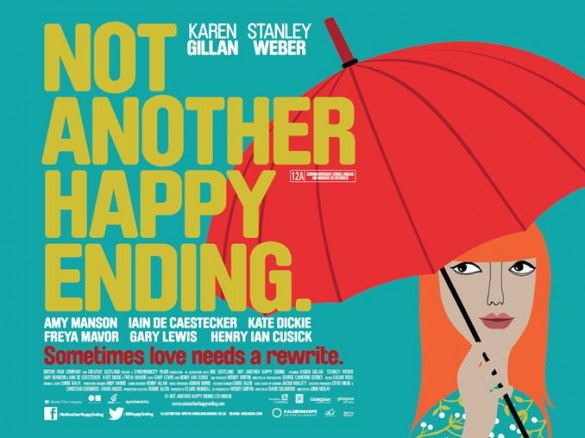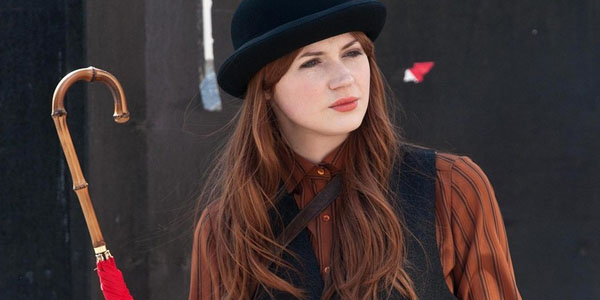
The romantic comedy is, sad to say, a quite fairly maligned genre. Quality exemplars are few and far between and, given the shortage of acceptable themes, plotlines and tropes, those few that work are over-mined ad nauseam.
Not Another Happy Ending, the third feature outing for Scottish director John McKay, is a 102-minute litany of overused romantic clichés and hard-to-credit plot points. Karen Gillan (Dr Who, We’ll Take Manhattan) plays Jane Lockhart, a first-time writer exorcising her demons by fictionalising her relationship with her absent father. Tomas Duval (Stanley Weber) (Borgia, Thérèse) is a volatile independent publisher, the only one willing to give Jane a chance (in the form of a two-book deal). The two get along brilliantly until he changes her book’s ghastly title (The Endless Anguish of My Father) for something rather more anodyne (Happy Ending) and she throws a hissy-fit. Happy Ending turns out to be a smash hit, and now only her second book stands in the way of Jane and Tomas never having to see each other again.
Unfortunately, suddenly with all sorts of reasons to be happy (new boyfriend Willie – Lost’s Henry Ian Cusick – reunion with dear old Dad – Gary Lewis from Billy Eliot – newfound success), Jane is struck with writer’s block. Based on a throwaway remark from his best mate Roddy (Iain de Caestecker) that writers must always suffer for their art, Tomas sets out to make Jane as miserable as possible to get her to finish the novel and leave his life for good.
The sheer implausibility of the premise alone – Jane’s first book was good because she and Tomas made a great collaborative team, so naturally not helping her at all will work second time around – is enough to make the film a tough watch, but within the first few minutes so many of the romcom boxes have been ticked, one wonders whether the film might actually have been written by a computer programme designed specifically for the purpose:
- The bad boyfriend/heroine utterly blind to his shortcomings – check (see also Sliding Doors, Legally Blonde, Notting Hill)
- The adorably kooky (she wears a bowler hat! And a man’s suit!), klutzy female lead – check (see also Bridget Jones’s Diary, Annie Hall, Juno, 80% of Julia Roberts films)
- The objectionable, unpleasant “romantic” male lead with a “heart of gold” – check (see also Pride and Prejudice, His Girl Friday)
- The inexplicable opulence of home, wardrobe and lifestyle in no way commensurate with a struggling creative (see also Sex and the City)
- The couple who loathe each other for much of the film, only eventually to realise they were meant to be together (see also When Harry Met Sally, The Shop Around the Corner, every romantic comedy ever made).
And yet the whole movie has an air of being so genuinely pleased with itself, one has to wonder if one is missing something. For a comedy, the jokes are extremely thin on the ground – but then, for that matter, so is the romance. The structure is sloppy, the relationships ill-defined; the dialogue is so bland the filmmakers resort to a greatest hits playlist (The Proclaimers, Emilie Sandé, etc) to convey those emotional cues that the movie itself fails to deliver.
For the first 25 minutes of the film one assumes that Roddy and Tom work together (Roddy answers phones in Tom’s office, greets visitors and listens with what appears to be personal interest to business strategies), then suddenly Roddy is teaching a class and we come to realise he is in fact a schoolmaster and just Tom’s mate. Despite having been estranged from her alcoholic father for years and so affected by it she took the time to write an entire novel about it, Jane shows no bitterness or ambivalence about his sudden reappearance in her life just when she finds fame and success. The local pub quiz final offers a trip to Disneyland (“not the shite one in Paris”) as a prize, despite having the world’s easiest questions (“Who was William Shakespeare’s wife?”). The only child of an alcoholic, working-class father and a dead mother, with no discernable source of income besides her writing, even before she gets a book deal Jane manages somehow to afford a truly gorgeous apartment in central Glasgow and a wardrobe that would make Carrie Bradshaw sit up and beg (with, perhaps, the exception of the shoes).
A romantic comedy with an implausible plot and pretty outfits is hardly something new, but this is rather the point. Viewers looking for a bit of fluff and romance in their viewing are being short-changed all over. Faced with the third-rate likes of How to Lose a Guy in Ten Days, Failure to Launch (yes, I’m looking at you, Matthew McConnaughey), Friends with Benefits… the list never ends – expectations are incrementally lowered until just about anything will suffice. The truth is that the majority of good romantic comedies are actually about something else; the romance is incidental. Pitch Perfect is about a capella – and two of the characters fall in love at the end. It’s genuinely funny and charming. Shaun of the Dead is about zombies – and two of the characters realise their relationship is worth saving even in the face of the Apocalypse. It’s scary and hysterical in turns. The Princess Bride is about pirates, giants, politics, rodents of unusual size… and true love. And it is joyous, silly and endlessly rewatchable. Even When Harry Met Sally is an exploration of the different forms relationships can take – the film would have been just as enjoyable if the two title characters had decided to just stay friends.
Any film needs a great deal more to hang its hat on than just the dragged-out exercise of crowbarring two intractable, unsuited people into a relationship, and a case of writer’s block which manifests itself in Jane’s baking and hallucinating her lead character, Darsie, simply isn’t enough. Tomas – the putative romantic hero of the tale – is so completely unlikeable one is almost cheering the odious Willie on. And despite a game performance from Karen Gillan – who at least is funny – there isn’t enough substance in the mix to make one care.
At least it spawned this insightful meme, inspired by a character who appears for no other purpose than to provide Roddy with proof of heterosexuality a potential girlfriend:







